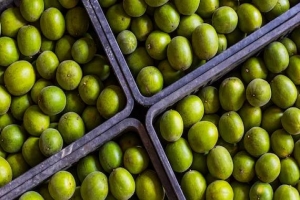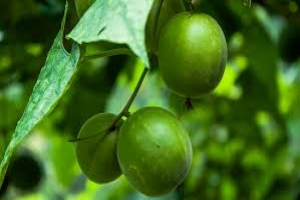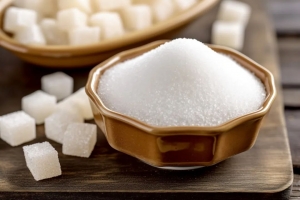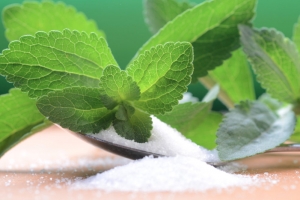Allulose, also known as D-psicose, is a rare, naturally occurring monosaccharide (sugar) that has gained interest in the food industry due to its low caloric content and sweet taste. It can be found naturally in certain fruits like jackfruit, figs, and raisins, but it's typically produced commercially through an enzymatic process from fructose.

In Europe, allulose has been subject to regulatory processes by the European Food Safety Authority (EFSA) and the European Commission. The use of allulose in foods is regulated under specific legislation that determines its approved uses, labeling requirements, and maximum levels permitted in various food categories.
As of my last update, allulose has been recognized as a food ingredient in the EU and can be used as a sweetener. However, specific regulations regarding its use and labeling may vary, and manufacturers must comply with these regulations when marketing products containing allulose.
If you're interested in using allulose in a product or if you're looking for allulose suppliers in Europe, you would need to ensure that the supplier is compliant with the current EU regulations and that the product meets the necessary safety and quality standards. Additionally, you might want to check for any recent updates or changes in the regulatory status of allulose within the European Union.
Regulatory Status:
Approval: Allulose has been approved as a food ingredient in the European Union. This means that it can be used as a sweetener in various food products.Labeling: When allulose is used in food products, it needs to be listed on the ingredient label. The exact name used for labeling might depend on the latest EU regulations.
Uses:
Food Products: Allulose can be used in a wide range of food products, including baked goods, beverages, confectionery, and dairy products.Health Claims: Depending on the scientific evidence available, manufacturers may be able to make health claims about allulose if it meets the criteria set by the EFSA.
Suppliers:
To find suppliers of allulose in Europe, you can search online directories, attend food industry trade shows, or contact food ingredient distributors directly. Some companies specialize in supplying allulose and other low-calorie sweeteners.
Compliance:
Manufacturers using allulose in their products should ensure compliance with the following:
Regulatory Requirements: Adhere to the latest EU regulations regarding the use and labeling of allulose.Quality Standards: Ensure that the allulose used meets the necessary quality and safety standards.
Market Trends:
Growing Demand: There is a growing demand for reduced-sugar and no-added-sugar products in Europe, which is driving the use of alternative sweeteners like allulose.Consumer Awareness: Consumers are becoming more aware of the benefits of reducing sugar intake, which is contributing to the popularity of allulose.
Regulatory Status:
As of 2023, allulose has been approved as a food ingredient in the European Union. The approval is based on the assessment by the European Food Safety Authority (EFSA), which concluded that allulose is safe for consumption. This means that allulose can be used as a sweetener in various food products.
Labeling:
When allulose is used in food products, it must be listed on the ingredient label. The exact name used for labeling might depend on the latest EU regulations. As of the last update, allulose can be listed as "D-psicose" or simply "allulose."
Uses:
Allulose can be used in a wide range of food products, including:
Baked goods: Cakes, cookies, bread, etc.Beverages: Soft drinks, energy drinks, sports drinks, etc.Confectionery: Chocolates, candies, gums, etc.Dairy products: Yogurt, ice cream, milk products, etc.
Health Claims:
Depending on the scientific evidence available, manufacturers may be able to make health claims about allulose if it meets the criteria set by the EFSA. For example, claims related to its low-calorie content or potential benefits for weight management could be made, provided they are supported by scientific substantiation.
Suppliers:
To find suppliers of allulose in Europe, you can CONTACT US:mailto:Colin@nutra-max.com or Online Chat:www.stmonk.com.
Here are a few examples of companies that supply allulose in Europe:
Ingredion: A global ingredient solutions provider that offers allulose.Tate & Lyle: A leading supplier of food ingredients, including allulose.Cargill: Another major supplier of food ingredients with a presence in Europe.
Compliance:
Manufacturers using allulose in their products should ensure compliance with the following:
Regulatory Requirements: Adhere to the latest EU regulations regarding the use and labeling of allulose.Quality Standards: Ensure that the allulose used meets the necessary quality and safety standards, such as those defined by the Codex Alimentarius or EU directives.
Market Trends:
Growing Demand: There is a growing demand for reduced-sugar and no-added-sugar products in Europe, which is driving the use of alternative sweeteners like allulose.Consumer Awareness: Consumers are becoming more aware of the benefits of reducing sugar intake, which is contributing to the popularity of allulose.
Latest Regulatory Updates:
Since the regulatory landscape can change over time, it's important to stay updated with the latest guidelines. You can check the official EFSA website or the European Commission's website for the most current information.
 The regulation of Monk Fruit Extract (also known as Luo Han Guo extract) varies across different cou
The regulation of Monk Fruit Extract (also known as Luo Han Guo extract) varies across different cou
 Health Canada Approves Monk Fruit Extract as a Natural Sweetener
Health Canada Approves Monk Fruit Extract as a Natural Sweetener
 New Breakthrough in Allulose: A Healthier Sugar Alternative Gains Momentum
New Breakthrough in Allulose: A Healthier Sugar Alternative Gains Momentum
 Understanding Reb-M: The Benefits of a Next-Generation Sweetener
Understanding Reb-M: The Benefits of a Next-Generation Sweetener